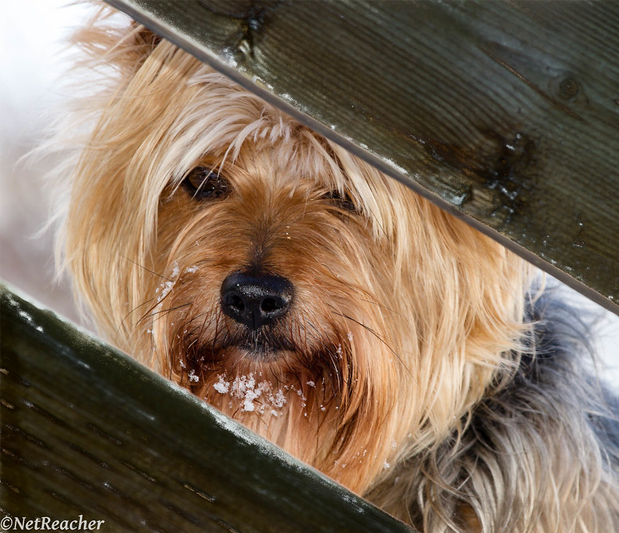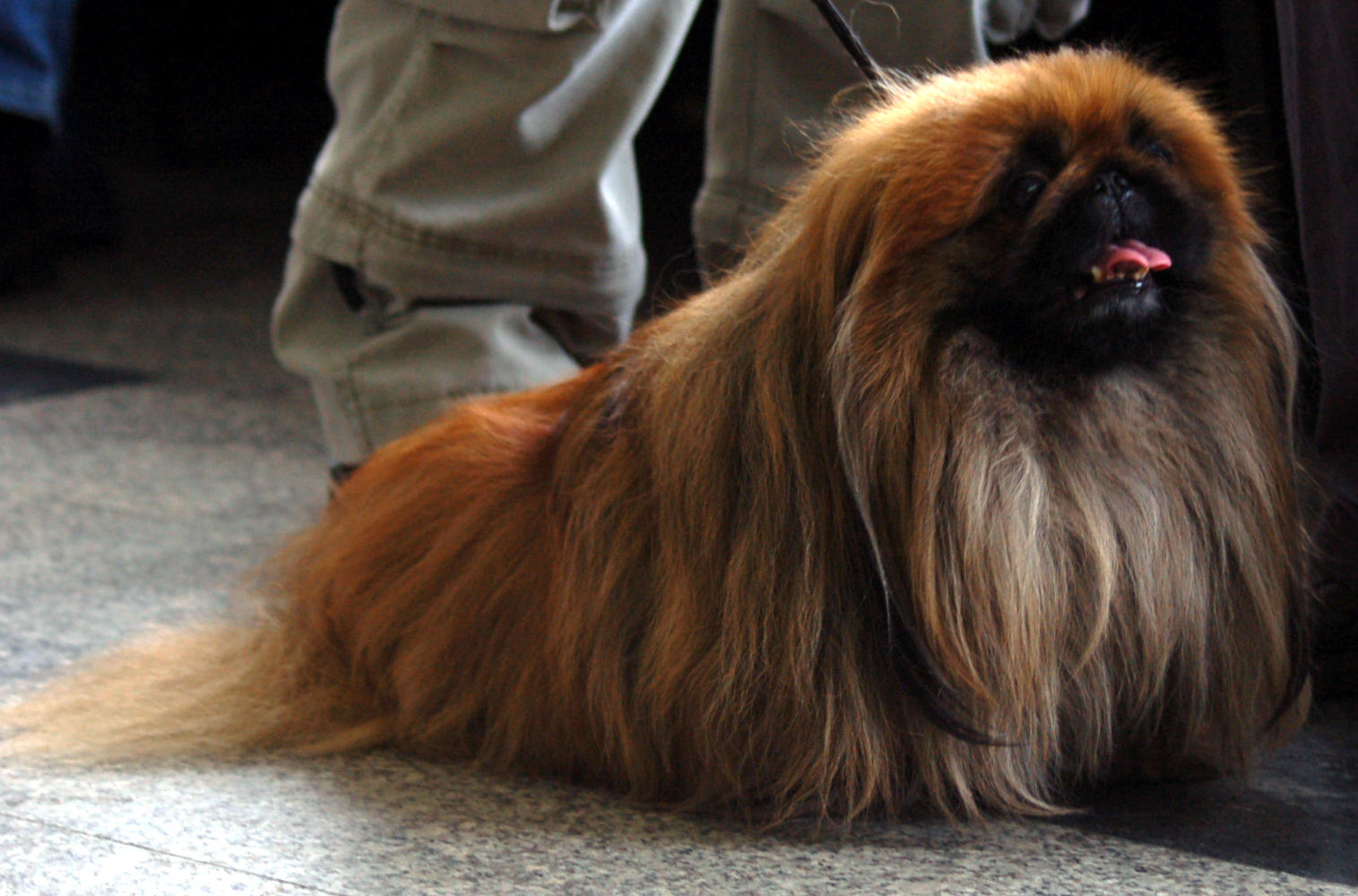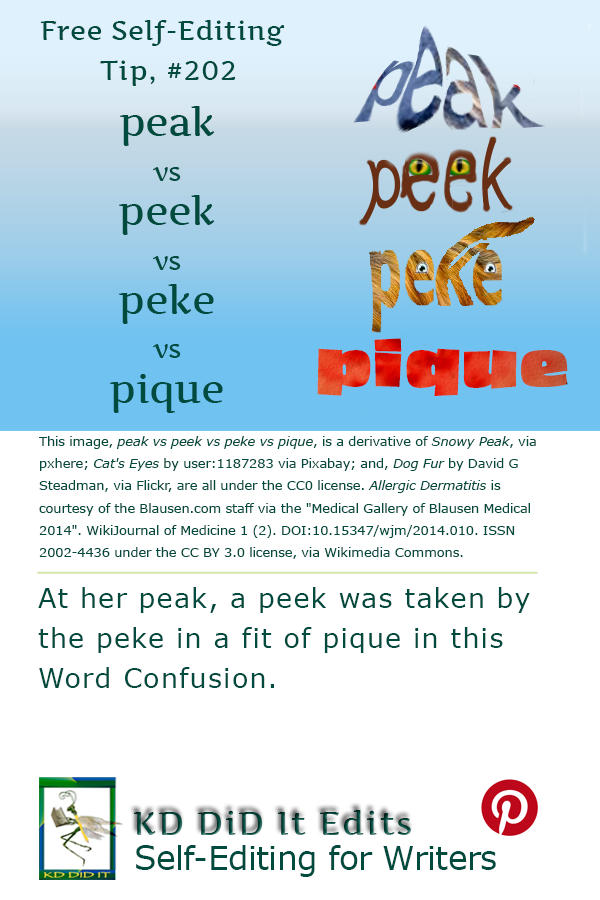Revised as of
15 Dec 2022
This word confusion is another one of my major peeves, in fact I’m piqued at the number of times I’ve run across this confusion. Yep, I’m feeling downright peaky when I consider the peak aggregate of confused peakiness. I just might set my Peke to bite someone . . . grrrr . . .
Sigh . . . I gotta sit down, ’cause I’m gettin’ a bit peaky after all that peeking . . .
I had to amend this Word Confusion when I realized, in a fit of pique, that this cute little Peke wouldn’t be coming home with me. All that excitement that had peaked in me? Yep, down the drain. In fact, I peeked in that drain and saw it all swirling away.
Word Confusions . . .
. . . started as my way of dealing with a professional frustration with properly spelled words that were out of context in manuscripts I was editing as well as books I was reviewing. It evolved into a sharing of information with y’all. I’m hoping you’ll share with us words that have been a bête noire for you from either end.
If you found this post on “Peak vs Peek vs Peke vs Pique” interesting, consider subscribing to KD Did It, if you’d like to track this post for future updates.
| Peak | Peek | Peke | Pique |
|---|---|---|---|

Downtown Colorado Springs by David Shankbone is under the GFDL or CC-BY-SA-3.0 license, via Wikimedia Commons. — A great view of Pike’s Peak. |

Peek-a-Boo Benji by James Vincent Wardhaugh is under the CC BY-ND 2.0 license, via Flickr. |

Pekingese by Lilly M (za zgodą mojej znajomej – wikipedystki) is under the GFDL or CC-BY-SA-3.0 license, via Wikimedia Commons. — Awww, a peke. |

Angry Penguin by Swantje Hess and Jannis Pohlmann under the GNU Free Documentation or CC-BY-3.0 license, via Wikimedia Commons. — Looks like a fit of pique to me. |
| Part of Grammar: | |||
| Adjective 1; Noun 1; Verb 1, intransitive 2 & transitive Plural for the noun: peaks Third person present verb: peaks |
Noun; Verb, intransitive
Plural for the noun: peeks Third person present verb: peeks |
Noun
Plural: Pekes, pekes Can be capitalized or not; be consistent |
Noun 1; Verb 1, intransitive & transitive 2 Plural for the noun: pique Third person present verb: piques |
| Adjective: Greatest, maximum 1 Noun: A projecting pointed part or shape A point in a curve or on a graph, or a value of a physical quantity higher than those around it The point of highest activity, quality, or achievement The maximum point, degree, or volume of anything [Nautical] Narrow part of a ship’s hold at the bow or stern [Nautical] Upper, outer corner of a sail extended by a gaff [British] A stiff brim at the front of a cap Verb, intransitive: [Archaic] Decline in health and spirits 2 Waste away Verb, transitive:
|
Noun: A quick, typically furtive look Verb, intransitive: To be just visible |
[Informal] Abbreviation for Pekingese dog | Noun: A feeling of irritation or resentment resulting from a slight to one’s pride 1 [Piquet] Scoring of 30 points on declarations and play before one’s opponent scores anything 2 Verb, intransitive: Verb, transitive: To wound (the pride, vanity, etc.) To excite (interest, curiosity, etc.) To arouse an emotion or provoke to action [Archaic] To pride (oneself) (usually followed by on or upon) [Piquet] Score a pique against one’s opponent 2 |
| Examples: | |||
| Adjective: At peak traffic hours, the level of smog increases dramatically. He did not expect to be anywhere near peak fitness by Christmas. That’s nuts! It’s peak travel time then. At peak hours, traffic speeds are reduced considerably. Noun: Jones was at his peak in the 1984 Olympics. She’s reached the peak of her political career already. Oil prices reached their peak last year. Verb, intransitive: Beat the egg whites until they peak. Sales tend to peak just before the holidays. Verb, transitive: Peak the halyard. The crew peaked their oars. |
Noun: A peek through the window showed that it was snowing. Aww, c’mon . . .just a sneak peek?? I had a quick peek into the bedroom. Verb, intransitive: A number of curtains were twitching as it seemed the whole town was peeking through their windows. The cheeks of her ass were just peeking out of those tiny shorts. |
My aunt raises pekes.
Oh, he’s just the cutest little Peke! My neighbor used to have Pekes. |
Noun: He left in a fit of pique. He stormed out of the room in a fit of pique. Lord Melbourne scored a pique against me. Verb, intransitive: Gads, I’ve been piqued! Verb, transitive: Her curiosity was piqued by the gossip. You have piqued my curiosity about the book. |
| Derivatives: | |||
| Adjective: peakish, peaky Noun: peakiness, peakishness |
Adjective: peekaboo Noun: peekaboo |
Adjective: unpiqued Noun: repique |
|
| History of the Word: | |||
|
Late Middle English pike or pyke is of unknown origin. | The first known use was in 1910.
Early 20th century abbreviation. |
|
C’mon, get it out of your system, bitch, whine, moan . . . which words are your pet peeves? Also, please note that I try to be as accurate as I can, but mistakes happen or I miss something. Email me if you find errors, so I can fix them . . . and we’ll all benefit!
Satisfy your curiosity about other Word Confusions on its homepage or more generally explore the index of self-editing posts. You may also want to explore Book Layout & Formatting Ideas, Formatting Tips, Grammar Explanations, Linguistics, Publishing Tips, the Properly Punctuated, Writing Ideas and Resources, and Working Your Website.
Resources for Peak vs Peek vs Peke vs Pique
Apple Dictionary.com
The Free Dictionary: peak, peek
WordReference.com: peak, pique
Pinterest Photo Credits
Snowy Peak, <https://pxhere.com/en/photo/14530>, via pxhere; Cat’s Eyes by user:1187283 via Pixabay; and, Dog Fur by David G Steadman, via Flickr, are all under the CC0 license. Allergic Dermatitis Blausen.com staff courtesy of the "Medical Gallery of Blausen Medical 2014". WikiJournal of Medicine 1 (2). DOI:10.15347/wjm/2014.010. ISSN 2002-4436 under the CC BY 3.0 license, via Wikimedia Commons. All are used as fills for the text.



This is GREAT I love the image
I saw this drawing by Shevi Arnold and had to use it. Shevi did such a great job creating an image that conveyed the meaning of the words…!